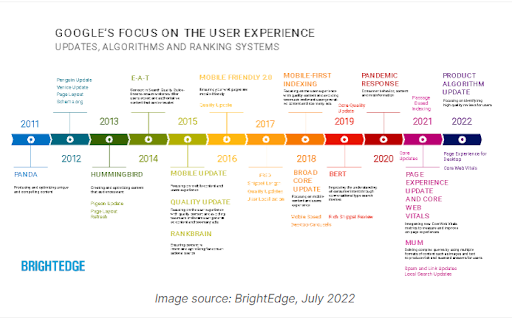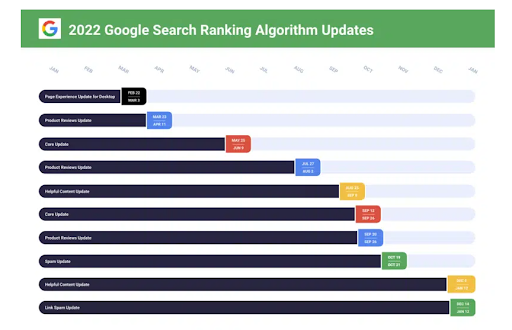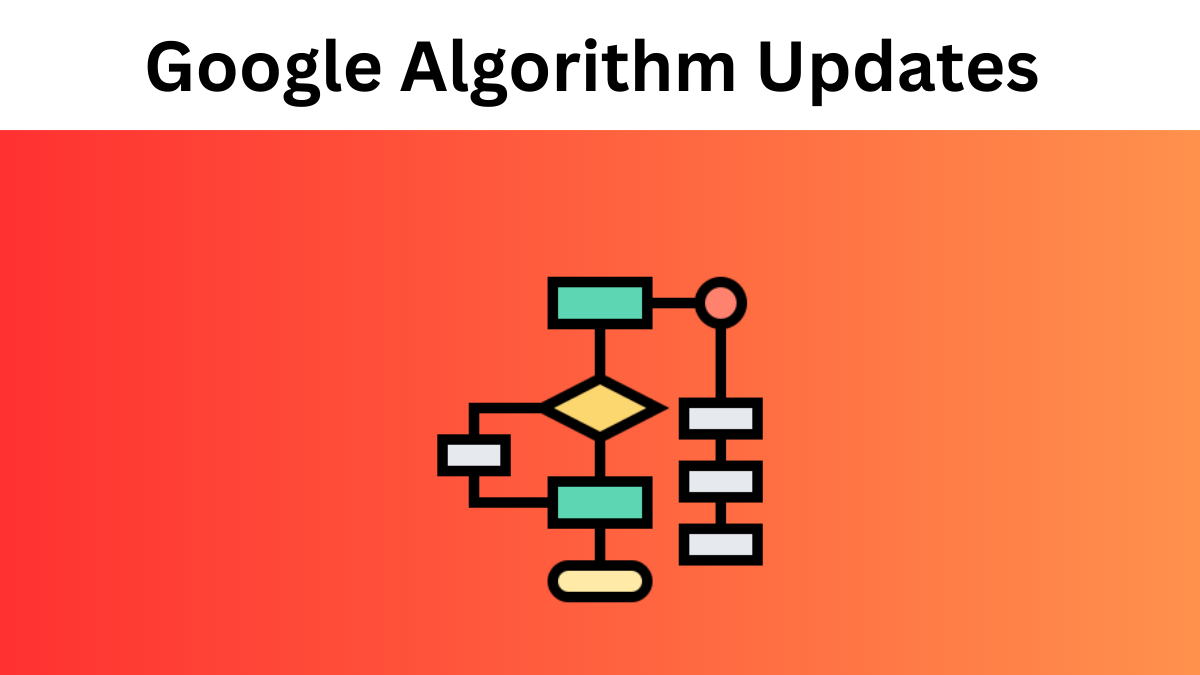The Human Experience: Unraveling Google Algorithm Updates and SEO Impact
Many google algorithm updates have caused massive and sudden changes in the SERPs for the past few years. Google’s core update is the most recent algorithmic change that generated much buzz within the SEO world. Google continues to focus on SERPs question-answer and continues to offer additional query matches in its “People also search for” feature.
Often it feels like SEO is just an endless dance between constantly moving targets. Whenever you think you’ve hit your stride with a particular strategy, Google updates its algorithm and everything changes.
Contents
Ever since the patenting of PageRank, you’ve been living in a world of constant change, and the impact of algorithm updates has become more pronounced as well.
Google Algorithm Updates: An Overview

According to Search Engine Watch, Google made at least nine changes to its algorithm in 2022.
Google is constantly making changes to its algorithm. These changes aim to bring quality content to the top of search results and make it easier for users to find what they want.
It needs to maintain its credibility and integrity.
The company monitors all its products and ensures they are up-to-date with the latest trends. But this also means several changes must be made to keep up with the changing times.
These changes are made through algorithmic updates.
Algorithms are mathematical formulas that help computers solve problems. Google uses algorithms to process information in its database and make it available to users when they type a query into the search engine.
Algorithm Updates: The Good and Bad

One important thing about Google algorithm updates is that they’re not all black and white. They’re not just good or bad — they’re somewhere in between.
If you’ve ever heard someone say, “the latest Google update killed my website,” then you know that not all algorithm changes are bad news. Some are very helpful for SEOs and webmasters by making it easier for search engines to crawl websites and index content.
For example, when Google introduced its Accelerated Mobile Pages (AMP) project in 2015, it made it easier for users by speeding up their mobile browsing experience and making it easier for search engines like Google or Bing to crawl those pages without having any impact on the user experience.
List of Google Algorithm Updates in 2022
Google is constantly updating its search algorithm. These updates affect the way that web pages appear in Google search results. To keep up with these changes, you must stay informed to avoid penalties and maintain rankings.
Here are some of the most notable Google algorithm updates.
December 2022 Link Spam Update
Google announced this update on December 14, 2022. The update was designed to eliminate “low-quality” links that were being used as a means of improving rankings in Google search results.
It was also intended to leverage SpamBrain’s capability to combat the proliferation of link-building schemes to manipulate Google’s rankings.
Google Helpful Content System Update
On December 6, 2022, Google announced that its ranking system would change from measuring website quality and trustworthiness (based on user feedback) to measuring how valuable content was for users using Google products like search results (based on user engagement).
This meant that websites with high user engagement rates would be ranked higher than those with low user engagement rates.
October 2022 Spam Update
This update focused on improving Google’s ability to detect web spam and low-quality content.
It also improved Google’s ability to identify websites that had no real value for users, which resulted in them being penalized by this algorithm change.
It was rolled out on October 19, 2022.
September 2022 Product Reviews Update
Google wants more people to review products online, so it released an update that increased the ranking of product pages with more reviews and reduced rankings for those with fewer reviews or none.
This is one of the most important Google updates that affected the organic search results for product-based businesses.
It was announced on September 20, 2022, and the rollout was completed on September 26, 2022.
September 2022 Core Update
This update happened in September 2022, one of Google’s most extensive updates ever.
The primary purpose of this update was to improve search quality by penalizing websites that violate Google’s rules or policies, such as advertising practices, excessive use of keywords in titles, descriptions, and URLs, etc.
This resulted in a significant drop in traffic for many websites using black hat SEO strategies to rank higher in SERPs (Search Engine Results Pages).
Helpful Content Update
This update was designed to improve search results by giving more weight to pages with helpful content, including articles and other long-form content written for users’ benefit instead of solely for commercial gain.
The announcement was made on August 18, 2022, and started rollout on August 25, 2022.
July 2022 Product Reviews Update
This update was rolled out on July 27, 2022, and has since been called “the product review update.”
It aims to reward sites with high-quality product reviews from real people rather than automated bots and fake reviews.
May 2022 Core Update
May 25, 2022, Core Update was one of the most critical updates in recent years. Google released this update on May 25, 2022, significantly impacting SEO.
It affected many sites using cloaking techniques or hidden text on their pages. It also affected sites using spammy links for rankings or any other purpose.
March 2022 Product Reviews Update
This update was released on March 27, 2022, by Google to improve the user experience when finding products online by removing low-quality product reviews from search results pages.
This update affected websites with fake reviews about products and services on their site. All major search engines now use user-generated content (UGC) as part of their ranking algorithms.
This update will affect how product pages appear in search results pages and how they rank.
Page Experience Update (Desktop)
This update was initially released in 2016 but was rolled out again in 2019 and then in February 2022 after being rebranded as “Page Experience” by Google.
This update aims to improve user experience by rewarding pages that provide a seamless experience across devices and platforms.
The main impact of SEO is that it rewards sites with responsive design and serves relevant content no matter which device someone uses or where they are located geographically.
Why Are Google Algorithm Updates Necessary?
Google mainly aims to provide users with relevant information as quickly as possible. To do so, they continuously monitor their search results and adjust their ranking signals accordingly.
It’s only natural that they would want to improve their existing algorithms by adding new ones, eliminating old ones, or making changes to existing ones.
Google has three main goals when it comes to algorithm updates:
- Provide users with the best experience possible
- Protect users from spammy content and sites
- Improve user trust in Google search results
Google’s mission is to organize the world’s information and make it universally accessible and helpful. To accomplish this goal, the search engine giant has developed several algorithms determining how pages are ranked in search results.
These algorithms are constantly improved based on new data from user behavior and online trends.
You may wonder why Google needs so many different algorithms when its primary goal is organizing information. The answer is simple: Google needs multiple algorithms because people use numerous ways to interact with search engines daily!
Impact of Google Algorithm Updates on SEO

Google is the most popular and powerful search engine on the planet, meaning any change it makes to its algorithm can majorly impact your website. The primary purpose of these algorithmic updates is to ensure that the quality of search results remains high and relevant.
So, whenever Google does any update, it significantly impacts SEO (Search Engine Optimization) strategies and traffic generated from search engines by websites.
This is particularly true if you run an eCommerce site or an online business that relies heavily on organic traffic for growth.
There are several changes that Google has made over the years that have had a significant impact on SEO; some have been good, others bad, but all have caused SEO professionals to rethink their strategies.
How Google Algorithm Updates Affect Your Site’s Positioning

Google updates can be divided into the core algorithm and regular, minor updates. The core algorithm updates are applied to all searches and are intended to affect all websites equally.
The other updates are specific to certain queries (such as local search or news).
Core Algorithm Updates
These changes are significant updates that typically happen once or twice a year.
They’re often rolled out gradually worldwide over several months or weeks, so they can take some time to roll out globally fully.
Semantic Core Algorithm Updates (also Called Semantic Updates)
These aren’t as significant as core updates and usually happen monthly or quarterly (or even less often). They focus on specific parts of the ranking algorithms instead of making sweeping changes to entire search areas.
The bad news is that there needs to be a way to know exactly when Google will release an update or how much impact it will have on your rankings. The good news is that you can prepare by knowing which types of sites tend to be affected by which types of updates and what to do once one hits your site.
Tips to Make Google Algorithm Updates Work for SEO

Google changes its algorithm frequently and keeps a tight lid on what goes into it, but we know that Google wants to give people the best possible experience when they search online.
Whenever Google makes an update, it’s likely to impact your website in one way or another — either positively or negatively. The good news is that these updates aren’t permanent and can often be fixed if you know what to look for.
Many factors affect how Google ranks your website, but the most important one is the quality of your website. A good website will rank higher than a poor one in Google’s eyes and get more traffic.
The more traffic you get from Google, the more money you make off it, right? So let’s see what we need to do to improve our rankings on Google.
Know When an Update Will Happen
The first thing you can do to prepare for Google algorithm updates is to know when they will happen. In general, Google does not announce when an update will take place, but some clues suggest that an upcoming change may be coming soon.
For example, if you see a spike in traffic from one keyword or a specific country over several weeks or months, this could mean that Google has changed its ranking algorithms to favor these kinds of queries more heavily than it did before.
This doesn’t mean that every website will see higher search traffic in these areas; it just means that ranking well for those keywords might increase traffic when the update rolls out across its network of sites.
Stay Wary of Low-Quality Content
The latest update was aimed at sites with low-quality content, so make sure yours doesn’t fall into this category.
If you write articles with many spelling or grammatical errors, consider hiring a copy editor or proofreading yourself before publishing each piece.
Be on Google’s Good Side
If a site has been penalized, it’s not because of one lousy link or one piece of content. It’s more likely that the site has been involved in suspicious behavior over time — for example, building links in ways that violate Google’s guidelines.
Sites penalized by Google usually have hundreds or thousands of unnatural links pointing at them from sites that violate Google’s guidelines.
Check Your Search Console Data
First, check your site’s crawl stats in Google Search Console (formerly Webmaster Tools). This will show how many URLs were crawled by Googlebot during a fixed period (usually one month).
If you see a sudden drop in the number of URLs visited by Googlebot, this could indicate an update that affected the indexation rate for specific pages or pages in general.
Wrapping Up
The algorithm is constantly changing, so it’s hard to track the true impact of a new update or when it will end—but one thing is sure: changes like these are never permanent.
The algorithms that Google uses for search are constantly shifting, evolving, and improving to respond to internet trends, changes in web usage, and fluctuations in search volume.
This latest change may be another step towards Google’s long-term goal of providing the absolute most relevant and accurate information to searchers.
